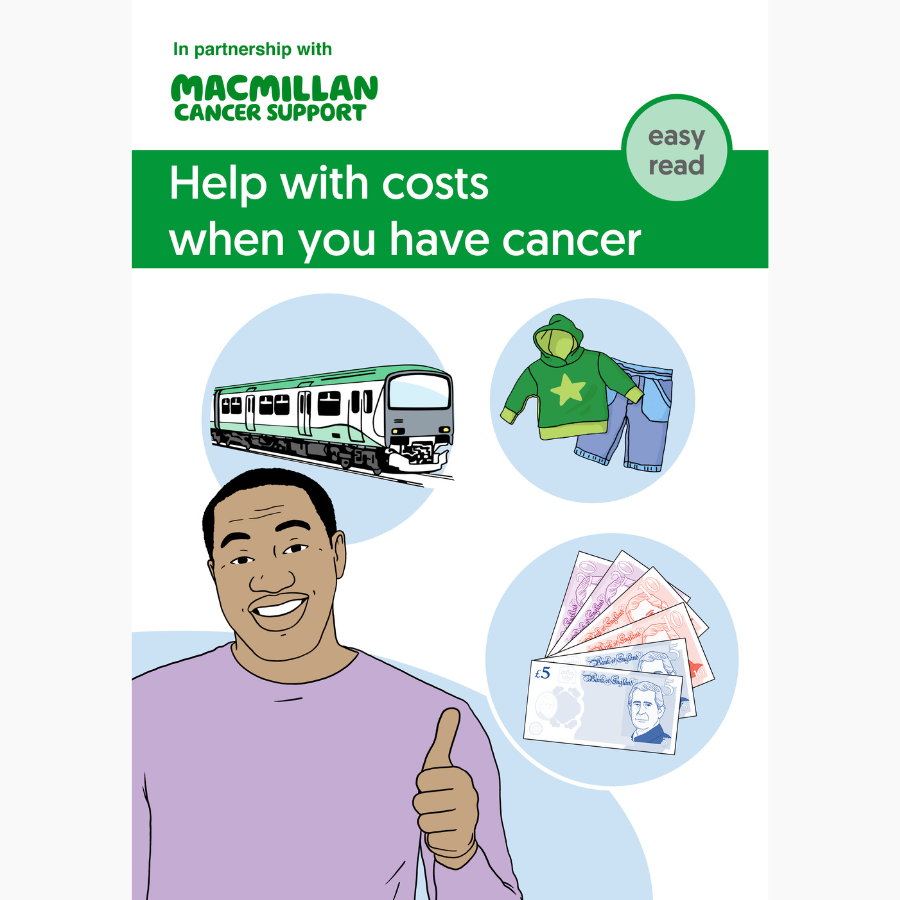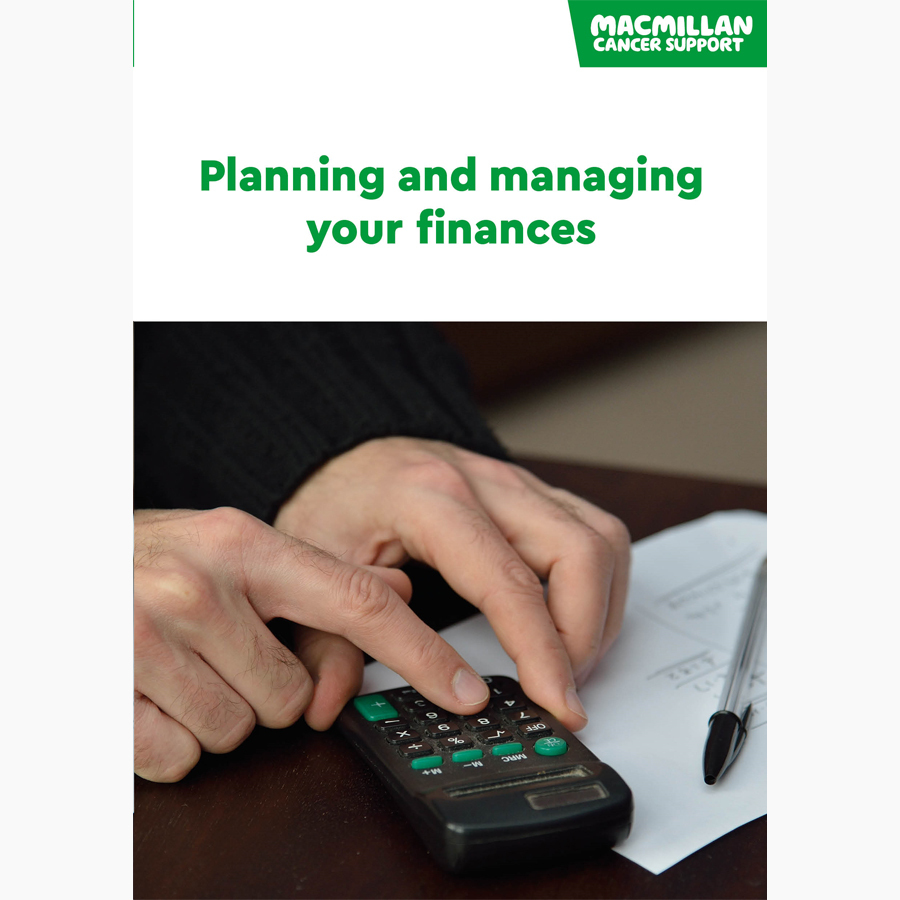Managing money when you have cancer
Managing your income
The first step is to make sure you have as much money coming in as possible to pay for what you need. The money you have coming in is called your income.
Types of income can include the following:
-
Work
This is the main source of income for many people. If you have cancer, you may need to take time off work. Your income may be less, but this does not mean your earnings have to stop completely. We have more information about work and cancer.
-
Benefits
You may be able to get benefit payments from the government. Our money advisers can help you find out which benefits you may be able to claim.
-
Savings or investments
If you have savings, now may be a good time to use them. But check if you can get extra income from somewhere else first, such as benefits or insurance policies. Our money advisers can give you information about accessing your savings and investments to provide an income. You can call them for free on 0808 808 00 00.
-
Insurance policies
If you have health, life, or protection insurance, you may be able to make a claim. Remember that insurance pay outs may affect what benefits you can get.
-
Pensions
If you have a private pension, you may be able to retire and claim your pension early because of ill health. There are benefits and disadvantages to accessing your pension early. It may affect any benefits you can get.
-
Grants
You may be able to apply for a grant from local or national organisations. These can help with the extra costs of cancer.
You can use our budget planner [PDF, 47KB] to write down your income and your spending. There are also online budget calculators, such as on the MoneyHelper website.
Make sure you have applied for any benefits, insurance payments or grants you may be entitled to. If you are unsure of what you could get, call us free on 0808 808 00 00 to speak to our money advisers.
Related pages
Managing your spending
It is a good idea to understand how your income and spending compare. This can help you stay in control of your finances. If your spending is higher than your income, you may need to think about making some changes.
It is a good idea to divide your spending into:
- essential items, such as rent or mortgage payments, utility bills and food costs
- non-essential items, such as holidays or meals out.
Usually, non-essential spending can be easier to reduce. But you may also be able to reduce spending on some essential items, if this does not affect your health
You could use our budget planner [PDF, 47KB] or an online budget calculator to track your spending. Writing it down may make it easier to see where you need support, or where you could make savings.
Types of costs
Your costs may include:
- housing costs, such as rent, mortgage payments, council tax or rates
- household costs, such as energy bills, water rates, phone and broadband bills
- credit card payments
- childcare costs
- health costs, such as prescriptions
- travel costs, such as travel to hospital and parking.
We have more information about bills and housing costs. Our budget planner [PDF, 47KB] can also help with this.
Credit cards
If you use credit cards and do not pay off your balance in full every month, you may be paying interest. You could transfer your balance to another card. Some cards offer 0% interest deals for a limited period. But there may be a charge for doing this.
You can check if this option will save you any money by using an online price comparison website such as:
They can give you an idea of your chances of being accepted for a credit card before you apply.
Many newspapers also include comparison tables in their personal finance section.
It is also a good idea to check if you have any payment protection insurance (PPI) on your credit card. This can help cover your monthly credit card repayments if you are signed off from work. We have more information about PPI.
If you are struggling to manage your banking, you can ask a family member or friend to help you. This may depend on what type of account you have.
Help from your bank
You can talk to your bank or financial provider about your cancer diagnosis. They will often be able to look at what support is available for you. Tell them if you think you may be unable to make any of your payments, such as your mortgage, loans or credit card payments.
Related pages
Booklets and resources
Planning a budget
A budget shows how much money you have coming in and how much you are spending. This can help show where you might be able to cut costs.
Our budget planner [PDF, 47KB] can help you work out your budget. Or you can use an online budget calculator, which will add everything up. You can also get personalised guidance on where you could make changes to help balance your budget.
You can plan your budget using weekly or monthly amounts, depending on what suits your situation. The important thing is not to mix the two – use either weekly or monthly amounts throughout your budget.
This is how you can convert between weekly and monthly amounts:
(Weekly amount x 52) ÷ 12 = monthly amount
(Monthly amount x 12) ÷ 52 = weekly amount
Working out your budget
There are 3 steps to working out your budget:
- Write down any regular income you have (monthly or weekly) and add it all together. This is your total income. Regular income may include your wages, money you get from a pension, or any money from investments or insurance claims.
- Write down everything you spend (monthly or weekly) and add it all together. For example, you might spend money on your rent or mortgage, bills, insurance payments or food and drink. This is your total spend.
- Take away your total spend from your total income. This gives you your balance. This is the amount you have left each month or week.
If your balance is less than zero, you are spending more money than you have coming in. This is called having a shortfall. To avoid a shortfall, check if you can increase your income and look at ways to spend less.
Booklets and resources
Ways to pay your bills
- Direct debit is the easiest way to make sure your bills are automatically paid on time.
- You can pay most bills and check your bank accounts online. This is often easier and quicker than paying by cheque or postal order.
- Some banks, water companies and energy companies have their own apps. This means you can manage your accounts on your smartphone or tablet.
- Try to avoid paying bills late, as you may be charged extra and it may affect your credit rating.
Direct debit
A direct debit means you have told your bank or building society to let an organisation take money from your account each month. For example, you might set up a direct debit with an energy company or a credit card company.
It is important to remember the following when you pay by direct debit:
- You give a company permission to take money from your bank account on a certain date. The payment may be taken a few days before or after this date if it is on a weekend or a bank holiday. The amount they take may change depending on how much you owe them.
- The company needs to tell you about any change to the amount and the payment date in advance. This is normally 10 working days before payment is due.
- Energy companies and phone providers often give a discount if you pay by direct debit.
- You need to make sure you have enough money to pay the direct debit in your bank account on the day before your payment date.
- You can arrange to pay your credit card balance by direct debit. You choose whether to pay off the full amount each month, a set amount or the minimum repayment.
To arrange to pay a regular bill by direct debit, contact the company providing the goods or service.
Online and telephone payments
If you can access your bank account online, you can pay your bills online. Some companies give you a discount if you pay this way. You may find it easier than having to go to a post box, post office or bank. But you will need to remember to pay your bills on time.
To arrange to pay a regular bill online, contact the company providing the goods or service.
If it is easier for you, payments may be made over the phone using telephone banking.
To sign up for online or telephone banking, contact your bank.
If you are thinking about borrowing money
Before you consider borrowing money, think about any other options you may have. It is also important to make sure you can afford to pay back the money you plan to borrow.
We have more information about borrowing money.
Buying financial products and services
Planning and managing your finances often includes buying financial products and services. These are things like loans, insurance and mortgages. Make sure you buy the right products and services for your situation. Think about:
- the amount of risk you can cope with
- what you can afford
- any taxes you pay
- any benefits you get
- how long you want to make payments for
- your health and the health of your family.
It is important to understand what you are buying. The Financial Conduct Authority says that a provider must give you information about:
- risk
- charges
- other important matters.
Providers must give you this information in a standard way. This helps you understand the product and compare it with similar products from other providers.
Make sure you read the whole product document, including any small print. You can do this yourself or ask for guidance from a financial adviser.
The main features of many products are explained in a booklet or section called Key Facts. It may also be called an Initial Disclosure Document.
You can easily find this information because it is labelled with the keyfacts® logo:
Information for carers
If someone is trying to control your finances
Cancer and domestic abuse
About our information
-
References
Below is a sample of the sources used in our finances information. If you would like more information about the sources we use, please contact us at cancerinformationteam@macmillan.org.uk
Energy savings trust. www.energysavingstrust.org.uk [accessed September 2022].
GOV.UK. Housing costs and Universal Credit. Available from www.gov.uk/housing-and-universal-credit/how-to-claim [accessed May 2022].
Gov.uk. www.gov.uk [accessed September 2022]
Gov.Scotland www.mygov.scot [accessed September 2022]
Gov.Wales. www.gov.wales [accessed September 2022]
nidirect.gov.uk www.nidirect.gov.uk [accessed September 2022].
-
Reviewers
Our financial information has been written, revised and edited by Macmillan Cancer Support’s Cancer Information Development team. It has been reviewed by finance, housing and energy experts and people living with cancer. It has been approved by Amanda South, Macmillan Financial Guidance Service Manager.
Our cancer information has been awarded the PIF TICK. Created by the Patient Information Forum, this quality mark shows we meet PIF’s 10 criteria for trustworthy health information.
Date reviewed
This content is currently being reviewed. New information will be coming soon.

Our cancer information meets the PIF TICK quality mark.
This means it is easy to use, up-to-date and based on the latest evidence. Learn more about how we produce our information.





